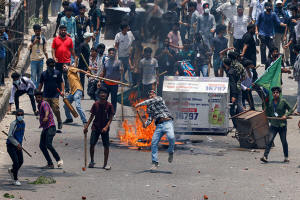Widespread telecoms disruptions in Bangladesh as student protests spike
 Send a link to a friend
Send a link to a friend
 [July 19, 2024]
By Mohammad Ponir Hossain and Sam Jahan [July 19, 2024]
By Mohammad Ponir Hossain and Sam Jahan
DHAKA (Reuters) - Telecoms links were widely disrupted in Bangladesh on
Friday, with television news channels going off the air amid violent
student protests against quotas for government jobs that have killed
nearly two dozen people this week.
Sparked by student anger against the controversial quotas, the protests,
some analysts say, are also being fuelled by economic woes, such as high
inflation, growing unemployment and shrinking reserves of foreign
exchange.
The government offered no immediate comment on Friday's severed
communications, but said police in Dhaka, the capital, had barred all
public meetings and processions indefinitely.
Police fired tear gas to scatter protesters in some zones of fresh
violence, Reuters journalists said, adding that security forces and
protesters milled about in the streets of Dhaka.
Protesters blocked roads at many places and threw bricks at security
forces, the English-language website of the Bengali newspaper Prothom
Alo said.
Thursday's violence in 47 of Bangladesh's 64 districts killed 27 and
injured 1,500, it added, while French news agency AFP put the day's toll
at 32, citing a police spokesman as saying 100 policemen were injured
with 50 police booths burnt.
Reuters, which reported 13 dead, up from a tally of six earlier in the
week, could not immediately verify the higher figures.
Citing unidentified sources, India's Economic Times newspaper said Prime
Minister Sheikh Hasina's government was forced to call in the army late
on Thursday to help maintain order.
Reuters could not independently verify the details.

The protests have also opened old and sensitive political faultlines
between those who fought for Bangladesh's independence from Pakistan in
1971 and those accused of collaborating with Islamabad.
The former include the Awami League ruling party of Hasina, who branded
the protesters "razakar", making use of a term that described
independence-era collaborators.
Authorities had cut some mobile services on Thursday to try to quell the
unrest, but the disruption widened nationwide the next morning, Reuters
witnesses said.
Overseas telephone calls and those through the internet were crippled,
while the websites of several Bangladesh newspapers did not update on
Friday and were also inactive on social media.
A few voice calls went through, but there ws no mobile data or
broadband, a Reuters photographer in Dhaka said, adding that even text
messages were not being transmitted.
News television channels and state broadcaster BTV went off the air,
although entertainment channels were normal, a Reuters witness said.
Some news channels displayed a message blaming technical issues, and
promising to resume programming soon, the witness said.
[to top of second column]
|

Anti-quota supporters clash with police and Awami League supporters
at the Rampura area in Dhaka, Bangladesh, July 18, 2024.
REUTERS/Mohammad Ponir Hossain

Streets in Dhaka were deserted with little traffic on Friday, a
weekly holiday in the Muslim-majority nation, but the witness added
that a protest rally had been called for 0800 GMT at the main
mosque.
There were no flight disruptions at the main international airport,
aviation website Flightradar24 showed.
WEBSITES HACKED
The official websites of the central bank, the prime minister's
office and police appeared to have been hacked by a group calling
itself "THE R3SISTANC3".
"Operation HuntDown, Stop Killing Students," read identical messages
splashed on the sites, adding in crimson letters: "It's not a
protest anymore, it's a war now."
Another message on the page read, "Prepare yourselves. The fight for
justice has begun," adding, "The government has shut down the
internet to silence us and hide their actions. We need to stay
informed about what is happening on the ground."Giant neighbour
India once again urged its citizens in Bangladesh to avoid local
travel and limit movement.
The nationwide agitation, the biggest since Hasina was re-elected
this year, has been fuelled by high unemployment among the youth,
most of them out of education or work, who make up nearly a fifth of
a population of 170 million.
Protesters want the government to stop setting aside 30% of
government jobs for the families of those who fought for
independence from Pakistan.
Bangladesh's Supreme Court, which has set an Aug.7 date to hear an
appeal by Hasina's government against a high court order last month
to reinstate the quota system scrapped in 2018, has suspended the
lower court's order until the hearing.
On Thursday, the government said it was willing to hold talks with
the protesters, but they refused, saying, "Discussions and opening
fire do not go hand in hand."
Dhaka's main university campus had been the site of the worst
protests, but Thursday saw bigger demonstrations elsewhere.
Reeling from the ripple effects of the Russia-Ukraine war,
Bangladesh got a $4.7-billion bailout from the International
Monetary Fund in January 2023.
In June it got immediate access to IMF loans of about $928 million
for economic support and about $220 million to fight climate change.
(Additional reporting by YP Rajesh, Sudipto Ganguly, Shilpa
Jamkhandikar, Shivam Patel and Ainnie Arif in India; Writing by YP
Rajesh; Editing by Clarence Fernandez)
[© 2024 Thomson Reuters. All rights
reserved.]This material
may not be published, broadcast, rewritten or redistributed.
Thompson Reuters is solely responsible for this content.
 |